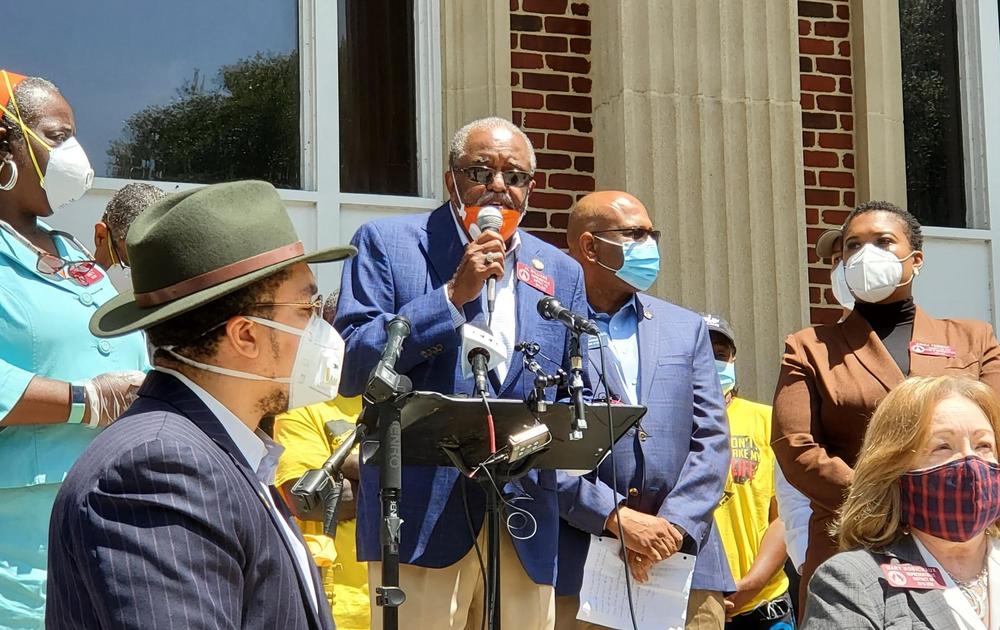Section Branding
Header Content
Citizen's Arrest Law Historically A Tool Of Lynchings
Primary Content
As Georgia’s legislative session resumes, some state lawmakers want to repeal the state’s citizen's arrest law. It has come under scrutiny following the killing of black jogger Ahmaud Arbery by white men who said they suspected him of alleged break-ins in their neighborhood. Historically, Georgia's citizens arrest law has been used to justify lynchings.
The two men charged with murder and aggravated assault, Gregory McMichael and his son, Travis McMichael, said they were trying to stop Arbery and talk with him when they pursued him through Satilla Shores, a neighborhood outside Brunswick. They told police there had been break-ins recently, and that Arbery had appeared on surveillance footage.
GBI Special Agent Richard Dial described suspect Gregory McMichael’s suspicions during a court hearing June 4.
“His statement to the effect is he didn't know Mr. Arbery had stolen anything or not, but he had a gut feeling that Mr. Arbery may have been responsible for thefts that were in the neighborhood previously,” Dial testified.
When Waycross District Attorney George Barnhill removed himself from the Arbery case because his son worked with McMichael, he wrote a letter advising police not to arrest the men who had admitted confronting and shooting Arbery. Barnhill said they were likely protected by Georgia’s citizen's arrest law.
Mercer University law professor Tim Floyd told GPB News he disagrees with Barnhill's assessment. “The law talks about a private person may arrest an offender if the offense is committed in the presence or within his immediate knowledge,” he said.
Floyd said it is unlikely the citizen's arrest statute applies to the McMichaels' actions. For one thing, they never saw Arbery commit a crime.
The prosecutor now handling the case has charged the McMichaels with murder and aggravated assault; a third person, William Bryan, who filmed the killing, has been charged with felony murder.
Travis McMichael’s defense attorney said in court that he acted in self defense, but did not bring up the citizen's arrest law.
Now, a bipartisan group of lawmakers wants the law off the books.
“When I looked up the law, the law was derived in the late 1800s. So it's an outdated law,” said Rep. Carl Gilliard, a Democrat from Garden City who is leading that push along with Republican Rep. Don Hogan of St. Simons Island and others.
Specifically, the law was passed in 1863 in the midst of the Civil War. The Emancipation Proclamation also took effect that year, and the Union army was bearing down on Georgia.
Mercer's Floyd said it is not exactly clear why the citizen's arrest law was created, but there is a clear pattern in how it was applied.
“Often during the lynching era, these white mobs would claim that they were exercising the right of citizen's arrest,” he said.
According to Floyd, the mobs were not following the law, which requires someone who performs a citizen's arrest to promptly turn the suspect over to law enforcement. It also does not allow for deadly force. But these claims of using the citizen’s arrest law rarely made it to court.
“One of the striking features about the lynching era is that the people who perpetrated the lynchings were virtually never brought to justice, never arrested, never tried,” Floyd said.
In a sense, the citizen’s arrest law was a legal engine of the lynching era. Georgia is second only to Mississippi in the number of people lynched by white mobs.
Three of those people were killed in Glynn County, the same county where Arbery was killed. In 1891, a mob of 300 people killed two black men they suspected of murder. In 1894, a mob of 100 men killed a black man accused of rape.
Many people calling for justice in the February killing of Arbery have called his death a lynching, too. They want change beyond the murder charges for the men accused in the case.
Rep. Gilliard said lawmakers should listen.
“We have an opportunity right now to seize this moment and to stand for Georgia -- to stand for America,” he said.
Gilliard said lawmakers may not vote on repealing citizen’s arrest until next year. But he is optimistic there is enough momentum to pass it during the current, brief session.


